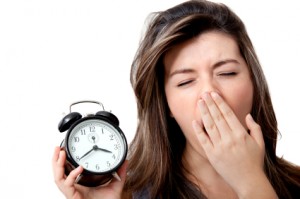One Night of Sleep Deprivation Can Rapidly Improve Depression
 One night of sleep deprivation can bring about rapid improvement in depression symptoms the following day. A 2017 meta-analysis by Elaine M. Boland and colleagues in the Journal of Clinical Psychiatry summarizes the findings from 66 studies of sleep deprivation for unipolar and bipolar depression and finds that the technique produced a response rate of 45% in randomized controlled studies.
One night of sleep deprivation can bring about rapid improvement in depression symptoms the following day. A 2017 meta-analysis by Elaine M. Boland and colleagues in the Journal of Clinical Psychiatry summarizes the findings from 66 studies of sleep deprivation for unipolar and bipolar depression and finds that the technique produced a response rate of 45% in randomized controlled studies.
It did not seem to matter whether patients experienced full or partial sleep deprivation, whether they had unipolar or bipolar depression, or whether or not they were taking medication at the time. Age and gender also did not affect the results of the sleep deprivation.
Extending the Effects
While sleep deprivation can rapidly improve depression, the patient often relapses after the next full night of sleep. There are a few things that can prevent relapse or extend the efficacy of the sleep deprivation. The first is lithium, which has extended the antidepressant effects of sleep deprivation in people with bipolar disorder.
The second strategy to prevent relapse is a phase change. This means going to sleep early in the evening the day after sleep deprivation and gradually shifting the sleep schedule back to normal. For example, after an effective night of sleep deprivation, one might go to sleep at 6pm and set their alarm for 2am. Then the next night, they would aim to sleep from 7pm to 3am, the following night 8pm to 4am, etc. until the sleep wake cycle returns to a normal schedule.
A 2002 article by P. Eichhammer and colleagues in the journal Life Sciences suggested that repetitive transcranial magnetic stimulation (rTMS), electromagnetic stimulation of the scalp over the prefrontal cortex, could help maintain improvement in depression following a night of partial sleep deprivation for up to four days.
Bright light therapy may also help. Researcher A. Neumeister and colleagues reported in the journal Biological Psychiatry in 1996 that 3,000 Lux light could stabilize the antidepressant effects of partial sleep deprivation for up to seven days.
In a 2000 article in the journal Psychiatry Research, C. Colombo and colleagues reported that morning light therapy improved the antidepressant effectiveness of three cycles of total sleep deprivation in people with bipolar disorder. The light, delivered at 150 Lux and 2,500 Lux, reduced sleepiness in the sleep-deprived subjects, and this reduced sleepiness was associated with a better response. Lithium also improved the effectiveness of sleep deprivation in the same bipolar population, but combining both lithium and light therapy with sleep deprivation did not produce a cumulative effect.
In a table in a 2003 article in the journal Dialogues in Clinical Neuroscience, Ulrich Voderholzer lists predictors of an antidepressant response to sleep deprivation in depressed patients, including: arousal, variability of mood swings, daily or day-to-day mood variations, melancholic depression, depression prompted by internal factors, and the bipolar subtype. Age, sex, severity or duration of depression, duration of illness, earlier treatments, and patients’ expectations did not predict response.
Studies by BNN editor Robert M. Post found that timing sleep deprivation as a patient approached recovery from a depression often triggered the patient out of the depressive episode completely.

